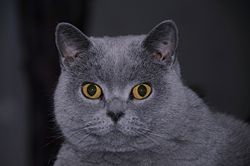British Shorthair: Difference between revisions
imported>Aleta Curry (copy edit) |
imported>Ro Thorpe m (unspaced refs) |
||
| Line 9: | Line 9: | ||
}}</ref> | }}</ref> | ||
==History== | ==History== | ||
Early breeding included interbreeding [[Russian Blue]]s with British Shorthairs. The British Shorthair was also bred with Persians during the mid-1900s. This was later discouraged. <ref name="urlTICA British Shorthair Breed Introduction">{{cite web | Early breeding included interbreeding [[Russian Blue]]s with British Shorthairs. The British Shorthair was also bred with Persians during the mid-1900s. This was later discouraged.<ref name="urlTICA British Shorthair Breed Introduction">{{cite web | ||
|url=http://www.tica.org/public/breeds/bs/intro.php | |url=http://www.tica.org/public/breeds/bs/intro.php | ||
|title=TICA British Shorthair Breed Introduction | |title=TICA British Shorthair Breed Introduction | ||
| Line 25: | Line 25: | ||
}}</ref> | }}</ref> | ||
==Coat== | ==Coat== | ||
British Shorthair cats have a dense short coat that is most often seen in a beautiful blue (the [[animal fancy]] term for gray). In fact, these cats were often called ''British Blues'' as this was their best known color. Today, the British Shorthair can be found in a wide range of colors and markings. | British Shorthair cats have a dense short coat that is most often seen in a beautiful blue (the [[animal fancy]] term for gray). In fact, these cats were often called ''British Blues'' as this was their best known color. Today, the British Shorthair can be found in a wide range of colors and markings.<ref name="urlwww.cfainc.org">{{cite web | ||
<ref name="urlwww.cfainc.org">{{cite web | |||
|url=http://www.cfainc.org/breeds/standards/british.pdf | |url=http://www.cfainc.org/breeds/standards/british.pdf | ||
|title=www.cfainc.org | |title=www.cfainc.org | ||
| Line 48: | Line 47: | ||
}}</ref> | }}</ref> | ||
==Temperament== | ==Temperament== | ||
These are quiet cats that do well with families. They do not like to be picked up or held much. They prefer snuggling next to their owner when they feel like it. | These are quiet cats that do well with families. They do not like to be picked up or held much. They prefer snuggling next to their owner when they feel like it.<ref name="urlwww.cfainc.org">{{cite web | ||
<ref name="urlwww.cfainc.org">{{cite web | |||
|url=http://www.cfainc.org/breeds/standards/british.pdf | |url=http://www.cfainc.org/breeds/standards/british.pdf | ||
|title=www.cfainc.org | |title=www.cfainc.org | ||
Revision as of 08:35, 31 August 2010
The British Shorthair hails from the United Kingdom but this cat's roots may go all the way back to Rome. They are also famous in literature, as the Cheshire Cat, found in the novel Alice In Wonderland, is reportedly based on the British Shorthair cat.[1]
History
Early breeding included interbreeding Russian Blues with British Shorthairs. The British Shorthair was also bred with Persians during the mid-1900s. This was later discouraged.[1]
Breed Standard
The British Shorthair cat is a quiet, heavy-set cat, known for its devotion to family. This cat is often called a “cobby” cat due to its squarish heavy-set build. They have a broad chest, short to medium strong legs, rounded paws, tail thick at the base with a rounded tip, large round eyes and a medium nose. Males tend to be heavier than females. Both sexes may take up to five years to reach their full mature size.[2]
Coat
British Shorthair cats have a dense short coat that is most often seen in a beautiful blue (the animal fancy term for gray). In fact, these cats were often called British Blues as this was their best known color. Today, the British Shorthair can be found in a wide range of colors and markings.[3]
Color
Colors range between white to orange and special markings and colorations are offered. Eye color is judged based upon the cat's specific coloration. Copper, gold, green or blue green are some of the eye colors found within the British Shorthair breed.[4]
Temperament
These are quiet cats that do well with families. They do not like to be picked up or held much. They prefer snuggling next to their owner when they feel like it.[3]
- ↑ 1.0 1.1 TICA British Shorthair Breed Introduction. Retrieved on 2010-08-28.
- ↑ Breed Profile - British Shorthair Cat. Retrieved on 2010-08-28.
- ↑ 3.0 3.1 www.cfainc.org. Retrieved on 2010-08-28.
- ↑ "". Retrieved on 2010-08-28. [e]
